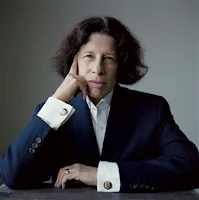
It comes down to whether you appreciate the conflations
Ashbery artfully manages as he penetrates the psychic membrane between Steven's
Supreme Fiction, that perfect of Ideal Types and their arrangements, with the
material sphere that won't follow expectation, nor take direction. I happen to
think that much of the interstices he investigates are results of artful
wandering; Ashbery is a flâneur of his musings, and the Proustian
inspection provides their idiosyncratic, insular joys. Had I thought Ashbery
overrated and a bore, I'd have turned my back on critical praise of him and
left him cold; I have a habit of keeping my consul regarding reading
preferences, as I'm sure all of us do. But continue to read him I do, over
several decades.
Not a rebel, not a polemicist, hardly a rabble -rouser who
makes speeches and writes incendiary essays against injustice, Ashbery is an
aesthete, a daydreaming intelligence of infinite patience exploring the
spaces between what consciousness sees, the language it develops to register
and comprehend experience, and the restlessness of memory stirred and released
into streaming associations. Ashbery's are hard to “get” in the sense
that one understands a note to get milk at the store or a cop's command to keep
one's hand above their head, in plain sight. Ashbery's poems have everything the
eye can put a shape to in plain sight, clouded, however, by thoughts, the cloud
bank of memory. He wrestles with the still-engaging problems of Aristotle's
metaphysics, that the things in the world are only the expression of an Idea of
that thing, which exists before manifestation. It's a slippery metaphysics, a
guarantor of headaches, but Ashbery wears the difficulty loosely; he pokes, prods,
wonders, defers judgment, and is enthralled by the process of his wondering.
Reaching a conclusion for him seems to mean that he is done writing, and no
poet wants to think that they've used up their vocabulary. One might think that the mtvU audience might be more
attracted to arch romantic and decidedly urban poet Frank O'Hara, whose
emphatic musings and extrapolations had equal parts rage and incontestable joy
which gave a smile or a snarl to his frequent spells of didactic erudition. He
was in love with popular culture, with advertising, movies, the movies, he had
an appreciation of modern art, he loved jazz and ballads, and he loved being a
City Poet. He was more the walker than Ashbery, I suppose, or at least he wrote
more about the going to and coming from of his strolls. Unlike Ashbery, O'Hara
loved being an obvious tourist in his environment, and didn't want for a
minute for his poetry to leave the streets, cafés, and galleries where he
treads. Ashbery is more the stroller who gets lost in his associations
triggered by what he beheld. Ever more the aesthete than his fellow New York
Poets, he was interested in things a little more metaphysical, that being that
the reality that exists in the interrelations being the act of perception and
the thoughts that are linked to it, which branch off from the perception and
link again with another set of ideas, themselves connected to material things
observed and remembered. O'Hara was immediate, like the city he loved, while
Ashbery allowed his senses the authority to enlarge his perception, to explore
the simultaneity of sight and introspection. In a strange way, Ashbery is the more sensual of the two,
willing to examine that even the sacrifice of immediate coherence. I’m not a
fan of difficulty for being difficult, but I do think it's unreasonable
to expect poets to be always unambiguous or easily grasped.
Not every dense
piece of writing is worthy by default, of course, and the burden falls on the
individual talent. Ashbery's writing, for me, has sufficient allure, resonance
and tangible bits of the recognizable world he sees to make the effort to
maneuver through his diffuse stanzas worth the work. Poetry is the written form where ambiguity of meaning and
multiplicity of possible readings thrives more than others, and the tradition
is not a parsimonious use of language, but rather a deliberate expansion of
what words pieced can do, what meanings they can evoke, and what sensations they're able to create. Prose is the form that is, by default, is required to have the
discourse it carries be clear and has precise as possible. Poetry and poets are
interesting because they are not addressing their experiences or their ideas as
linear matters subject to the usual linguistic cause and effect; poetry is
interesting because it's a form that gives the inclined writer to interrogate
their perceptions in unexpected ways. The poetic styles and approaches and
aesthetics one may use vary widely in relative degrees of clarity, difficulty,
and tone, but the unifying element is that poetry isn't prose, and serves a
purpose besides the mere message delivering that is, at heart, the basic
function of competent prose composition.





